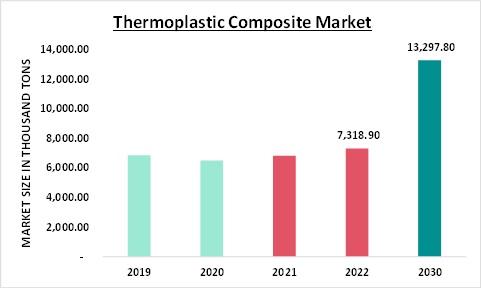Innovation and sustainability are driving forces reshaping industries across the globe, and the Thermoplastic Composites Market stands at the forefront of this transformation. As traditional materials face challenges in meeting the demands of modern applications, thermoplastic composites offer a compelling alternative. This article explores the evolution, current landscape, and future prospects of the thermoplastic composites market.

The Thermoplastic Composites Market was valued 6,841.5 Thousand Tons in 2021 and is expected to reach 13,297.8 Thousand Tons by 2030, at a CAGR of 6.62% during the forecast period.
Evolution: Thermoplastic composites have emerged as a result of advancements in material science and manufacturing technologies. Unlike thermoset composites, which are irreversibly cured during processing, thermoplastic composites can be melted and reshaped multiple times without sacrificing performance. This characteristic not only facilitates easier processing but also enables recyclability, aligning with the growing emphasis on sustainability.
The aerospace, automotive, construction, and consumer goods industries have been early adopters of thermoplastic composites. In aerospace, these materials offer significant weight savings, enhancing fuel efficiency and reducing emissions. In automotive applications, they contribute to the development of lightweight components, improving vehicle performance and range in electric vehicles. Moreover, their durability and corrosion resistance make them ideal for use in construction and consumer goods, offering longer product lifecycles and reduced maintenance costs.
Current Landscape: The thermoplastic composites market is witnessing rapid growth, driven by increasing demand across various industries. According to recent studies, the market is expected to register a compound annual growth rate (CAGR) of over 8% during the forecast period. Several factors contribute to this growth, including technological advancements, favorable regulatory policies promoting lightweight materials, and a shift towards sustainable manufacturing practices.
Polypropylene, polyamide, polyetheretherketone (PEEK), and polyphenylene sulfide (PPS) are among the most commonly used thermoplastic matrices in composites. These materials offer a combination of mechanical strength, chemical resistance, and thermal stability, making them suitable for a wide range of applications. Additionally, the integration of reinforcing fibers such as carbon fiber, glass fiber, and aramid fiber further enhances the performance characteristics of thermoplastic composites.
The aerospace and automotive sectors continue to be major drivers of demand for thermoplastic composites. In aerospace, the focus on lightweight materials to improve fuel efficiency and reduce emissions is expected to drive significant investments in thermoplastic composites. Similarly, the automotive industry is witnessing a shift towards electric vehicles, where lightweight materials play a crucial role in extending range and improving overall efficiency.
Future Prospects: Looking ahead, the thermoplastic composites market is poised for continued expansion, fueled by ongoing research and development efforts aimed at enhancing material properties and reducing production costs. Advancements in additive manufacturing, also known as 3D printing, are opening up new possibilities for the fabrication of complex geometries using thermoplastic composites.
Moreover, the increasing emphasis on sustainability and circular economy principles is expected to drive the adoption of recyclable thermoplastic composites. Manufacturers are investing in closed-loop recycling processes to reclaim and reuse materials, thereby minimizing waste and reducing environmental impact. This shift towards circularity aligns with the broader industry trends towards sustainability and responsible resource management.
In conclusion, the thermoplastic composites market represents a dynamic and promising sector within the broader materials industry. With its unique combination of performance, versatility, and sustainability, thermoplastic composites are poised to play a vital role in shaping the future of various industries, from aerospace and automotive to construction and consumer goods. As innovation continues to drive the development of new materials and manufacturing processes, the potential applications for thermoplastic composites are only set to expand further, ushering in a new era of lightweight, durable, and eco-friendly products.
About Market Research Future:
Market Research Future (MRFR) is a global market research company that takes pride in its services, offering a complete and accurate analysis of diverse markets and consumers worldwide. Market Research Future has the distinguished objective of providing optimal quality research and granular research to clients. Our market research studies by products, services, technologies, applications, end users, and market players for global, regional, and country level market segments, enable our clients to see more, know more, and do more, which help answer your most important questions.
Contact:
Market Research Future (Part of Wantstats Research and Media Private Limited)
99 Hudson Street, 5Th Floor
New York, NY 10013
United States of America
+1 628 258 0071 (US)
+44 2035 002 764 (UK)
Email: sales@marketresearchfuture.com
Website: https://www.marketresearchfuture.com


